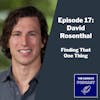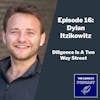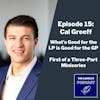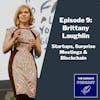Episode 3 - Lessons from 250K Miles a Year with Paul Singh
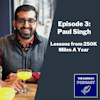
Paul Singh is an angel investor, former managing director at 1776, Founder at Disruption Corporation, and Partner at 500 Startups. His career includes stints at both large and small companies and stops all across the country in a search to find founders in which to invest. These experiences have given Paul a unique perspective on how to become successful in Venture Capital.
Key Takeaways
How should a new VC go about raising a fund today? What about one outside Silicon Valley? How about just as a solo investor? What are all the considerations you must take into account in order to be successful in this industry today…and tomorrow?
Zigging Just Because Everyone Else is Zagging Isn’t Contrarian
Investors need to do something different, and of course, there’s no formula for how to do that. Paul explains why he drove across the country for years to diversify his investment geography, explains how micro-investors are at risk of extinction, and how to build a unique business model as a VC.
“I think to be a successful investor in this day and age, especially as an Angel, you’ve got to build a pathway to becoming an API to capital and functional expertise. You can’t be the dumb money in anymore because there’s no room for that.” – Paul Singh
Lessons from 250K Miles A Year With Paul Singh
👋 Hey! Thanks for checking out the GoingVC Podcast: Uncovering new paths into VC, diving deeper into alternative models, and addressing areas of weakness every second Monday with Austin and JJ MacLean (@jjmaclean) from the GoingVC team.
We're really excited to be bringing to you today our conversation with Paul Singh (@paulsingh).
If you've got any questions, feedback, guest ideas, or just want to say hey, don't hesitate to shoot us a message at podcast@goingvc.com
Episode Chapters
- Introduction
- Paul’s Origin Story – 01:54
- Being Everywhere Else | Trekking Across North America – 10:35
- Angels, Syndicates and Microfunds – 15:50
- Learning to Make ‘The Bet’ – 22:20
- Paul’s Advice for Angels – 24:55
- Results Junkies – 33:30
- Geography, Geography, Geography – 36:29
- Wrap-up & Closing Thoughts – 41:03
The transcript has been edited and condensed for readability.
Paul’s Origin Story
JJ [00:1:54] — Thanks again for joining us today Paul! To set the stage for the listeners, could you start by giving everyone a two-minute rundown on your background?
Paul — Yeah! The truth of it is, I’ve sort of tripped and stumbled my way forward. The short version is, I started working in tech of some sort at 18, I’ll be 40 in March. I don’t even think I was a paid employee, an intern, at America Online. I worked in the data centers, things like that. It was a pivotal role for me.
Going into it, I thought tech was a fad. Half of the people in the 90s thought the internet was a fad; the other half thought it was the future. I was an idiot and young and didn’t know what those things were, but I got this job at AOL, and it changed my life. It showed me that where you lived didn’t matter anymore. I started realizing that entrepreneurship was a path that didn’t require you to have a ton of money.
I started selling people websites in college. This was the late ‘90s, and websites were hard. You probably had a university domain name, and then it was blinking HTML and static sites.
I had a hard line, sort of like a DSL connection with a fixed-IP, in my parent’s basement, and an old computer that I had won in a spelling bee that served up the sites. It sounds unsexy, but the point is that I started selling people websites. Paid ads didn’t exist back then, you got customers through direct sales, trade magazines, and I didn’t have money for that.
What I did was use the WHOIS system. I’d figure out who administrated a site through the WHOIS system and call them up, thinking if I made 200 calls a day and could close on 10-20 of them pretty quickly, you go from making $400-500 to $4000 a month. It was real money fast. I did that for about six years and, believe it or not, built that business up. It was a fun cashflow machine; by 2004, I had these large cages inside of data centers things like that.
Fast forward to 2004, and I was still running the business, but hands-off, and started dabbling in other things including, believe it or not, buying gas stations and stuff like that. It was a really good experience.
Skip forward again, and by 2008 I’d started angel investing. I was on Hacker News a lot back then, met some people there. It sounds so weird, but whatever, I’d DM people: “Hey, I liked your post, what’re you doing/etc..” I was able to invest early alongside some people through that, companies like FreshBooks. I didn’t know what I was doing; to be honest, I was sort of following what other angels were doing at the time. I’d also be lying to you to say I had a thesis; I was just investing.
I’m telling you this, of course, with the clarity of hindsight, but at the same time, I was trying to figure out, how do you do this? How do you find these founders? How do you vet them? I didn’t know any better; I didn’t know anyone in Silicon Valley.
I live outside of Washington, DC. The place I grew up in is a small dairy town of 8,000 people. I knew of Silicon Valley but didn’t know anyone there. I started going to demo days, back when that was a thing and ran into Dave McClure one day. He was also investing in this stuff; think he was at Founders Fund at the time. He had a really interesting model of investing, and I remember sitting in the Z Gates at Dallas Airport talking to him on the phone one day when he said, “Hey, we could build a fund around this thesis, invest in a lot of stuff.”
It was all him; I’m not taking any credit for it. You could tell in the early days he was connecting the dots, and long-story-short the first close for 500 happened in July 2010, and Dave and Christine and I became the first three partners.
Skipping forward again, I spent the first few years at 500 learning about what running a VC fund was all about. Up until that point, I had been investing my own money, and now here I was, along with Dave and Christine running a fund. It took us forever to close that first $30M. I remember many people made fun of us, “$30M, those are smaller than my management fees!” but we had solid convictions and convictions without data, I should say, but we had strong convictions. It’s 2010; it doesn’t take $500K to test an idea anymore.
I spent three years there full time—fundraising, investing, hiring; when I left, I think, we were at 50 employees. I wanted to dabble in my own stuff again. I started investing; I started a company called Dashboard, which eventually became Disruption Corp. It didn’t go very well for me, but I was able to soft-land it through an acquisition by a company called 1776. The point is, though, I find myself back on the other side of the pendulum.
Today, I wear two hats → one is my angel investor hat. I still take money from my other investments and try to make around 200 new investments a year; two-thirds in what I call ‘venture scale possibilities,’ and the other third in what we call ‘Main Street Reality’—daycares, taco trucks, you name it. Then on the operator side, and this is something I’ve never really talked about publicly before, but two or three years ago, I got really interested in one of our portfolio companies. I called the founders up and said, “Hey! I want to build your revenue team; I think you could grow faster” and since then helped them grow from around $1M in top-line revenue to $35M this year and $100-$120M next year.
It’s been interesting to be an angel and operator now. I can take the skills I am learning on the operator side and apply them back to help our companies grow, and at the same time, I can see what a lot of other companies are doing and take some of those tactics back into the business as well.
Austin [00:08:12] — That’s really cool! If you were to look back at your career, there’s an obvious arc there. You were an angel, then a VC, started in tech as you alluded to 20+ years ago but didn’t see it coming back then. Was there a point where you said, “Hey, I want to be in this tech/silicon valley world”?
Paul — Interesting question! I don’t think I’ve ever thought about it, but let’s think through it together. In hindsight, I don’t think I ever made a conscious decision, never woke up one day, and said “hey! Let’s be in tech!” but I always found it interesting and truthfully also didn’t know what else to do.
I’ve always been really curious. One of my curses has been trying to understand how other businesses work. I’m the weirdo that signs up for every newsletter I can come across, not because I care about the content as much as I’m trying to reverse engineer how they make their money. My inbox is a total nightmare, but the reason I do it is it’s interesting: I’m like, “how does this work? What’s their call to action? Look at their copy!”
I’m not a doctor, and I’ve never been diagnosed with it, but I bet I have ADHD because my attention always goes towards things I want to learn more about. I also love the fact that tech just moved faster than most industries. That always drew me back in. One of the things I think is interesting is we’re starting to see tech hit the real-world. The thesis I talk about with my wife quite a bit is that I believe most of the money to be made over the next decade is at the intersection of online and offline. I think it’s exciting; we’re finally seeing brick and mortar industries embrace tech more quickly.
Let me pause here. The core answer to your question is that I never made a conscious decision, but I’ve always been curious about tech, curious about industries that moved fast, and those just kept my attention.
I will say that the more time I spent in Silicon Valley, the less I wanted to be there.
Austin [00:010:04] — Yeah. Yeah. I can understand that.
Paul — I want to be clear, I don’t have anything against the people that want to be there, but what I find interesting about Silicon Valley is that nobody is from there. Where I live in Virginia, people are from here. If you go to New York, though, nobody is from there; they all moved there. It’s similar to Silicon Valley. I love going there for vacations, but hate going there for work. Because if you ask people where they’re from, they all started somewhere else, and I’ve always been intrigued by this idea of “what if we went to them.” Why do people need to be here?
Being Everywhere Else – Trekking Across North America
Austin [00:10:35] — This is an excellent opportunity to transition to my next question! On your blog, you talk about driving and traveling all across North America. I’d love to get into why you do that. If I were to start a fund in Milwaukee, what challenges would I face? Why should I be driving around? I’d love to hear your experience with that.
Paul — There’s quite a bit to unpack there! Let’s take this from the audience’s perspective. I’m guessing if you’re listening (reading) this, you’re intrigued by the idea of raising a fund or being an angel, or maybe you’re on the other side of the table. With that in mind, you’ve got two questions: why do I drive/fly, and what should a new fund manager in Milwaukee do. They’re both interesting topics.
Let’s tackle the travel piece first, and if you stay with me, I’ll try and connect the two. I think they’re both extremely related. On the travel side, if you want to be successful in the investing side of the business, you’ve got to either be extremely early, have a broad spread, or have a ton of capital and probably be later stage in a place like Silicon Valley. There’s no in-between. You either need to be everywhere with a little bit of money, or you need to build an index-fund almost or have a ton of dry powder and sort of just pick-off the winners when they’re already obvious. There’s a big no-man's land in between those extremes.
When I started learning about these people who worked in Silicon Valley, I knew they were very smart. You don’t manage a billion-dollar fund without being smart. I was then left with the question of how do you fight that? The answer is, you don’t. You don’t go head-on against an elephant. My thought was if the Silicon Valley thesis was fundamentally “we have all the money, we’re a magnet,” then I had to go in the other direction. If those guys were going to sit in their offices with their large checkbooks, I would find the cheapest flight I can and go everywhere else. I’m going to build the other side of this portfolio—a portfolio of little bets.
I had just read a book by Peter Sims, called Little Bets: How Breakthrough Ideas Emerge From Small Discoveries and I was like, okay, let’s make a lot of little bets so when some of them do grow, we’ve got a good relationship, and I’ll be first in line to give them more money when they raise the next round. In the worst case, if they get the attention of the funds in Silicon Valley, I’ve got my contractual pro-rata obligations to double down.
From 2010-2014/2015, I was flying anywhere from 150-250K miles a year. Finding the cheapest flight every Monday and going somewhere. I didn’t have kids back then, which made it a lot easier. Fast-forward to 2015, though, and I was a little burnt-out of being that ‘road warrior in the air.’ I’d also had my daughter and realized that Dad couldn’t be away 100% of the time, so the thought was, why not get an RV and take the family? My daughter’s not in school yet; let’s get a little RV and travel together.
The point is, though, I was visible everywhere else. If you see all the other investors doing one thing, you’ve got to go the other way. If you see how they’re building their portfolios, you’ve got to go the other way. The investment business is about finding alpha, right? You can’t find alpha by building the same portfolio. It started out of necessity, but I also really enjoyed it. I loved meeting new people.
Now let’s change over to the other part of your question → what should a new fund manager in Milwaukee do? Or someone here in Virginia? Let me start by saying the biggest mistake I think new investors can do is trying to be the biggest fish in their own backyard. If that new fund manager is like most people, they’ll try to be the biggest investor in Milwaukee or try to be the biggest one in the Midwest.
I get why people say that, but what you’ve got to come to terms with is that returning money in venture capital is hard. I’ve not been able to figure out how to generate real returns, limiting myself to specific geographies like that. It just doesn’t work.
What I would do, and what I do, is keep a low-profile 100-200 miles from home. It’s not that I don’t want to invest here, but that I’d much rather invest everywhere else. If you’re going to start investing, you need to be thinking nationally and internationally. Don’t even think about your home town. Think about returning money, then ask yourself where the returns are coming from. The second thing I would say is to start looking at AngelList Syndicates and Rolling Funds.
To recap, for me, travel was a necessity. You had to be on the ground because you can’t trust every local angel group to tell you the right thing. I think, though, for the next ten years, I would double down thinking about AngelList Syndicates and Rolling Funds. They help you scale a lot faster. You can be in many different places without having to jump on an airplane every other day.
Angels, Syndicates and Microfunds
Austin [00:15:50] — Got it! It sounds like you could look at it in one of two different ways. You can travel, do your due diligence and discovery process. Get all the information from as many places as possible and then return to your process to generate alpha.
I’m curious, is an AngelList Rolling Fund an alpha generator, or is it more like a new model people need to generate any sort of return. It’s the new standard because Silicon Valley is so saturated, and everyone is going to be everywhere through technology?
Paul — Yeah! Let’s be tactical here. If somebody were to ask me for advice, which is a bad idea, but if they were, I think the fundamental question is two things.
Number one, what do you believe that everybody else would disagree with you on. Then number two, where do you think returns come from? Those are rhetorical questions, but let’s be tactical about it. If somebody were listening to this right now, what I would do is get on AngelList. I would be the fastest follower in every deal. I’d try and be the last $1000 in as many Syndicates as possible. The worst-case scenario is I am now getting access to asymmetric information, learning how other VCs leading these Syndicates are investing. Getting access to the same information they are and why they’re doing the deal helps me inform my thesis. The second part of the question is to make sure you reserve capital for follow-on.
Many investors will disagree with me on this, but I believe that my first check into a company, whether it’s $10K, $20K, $300K is about buying a seat at the table so that I can double-down heavy. That’s where the money is made. You’ve got to allocate for the follow-on.
Let’s recap the strategy real fast. If you’re starting today, I would recommend being the last thousand dollars in as many Syndicate deals as you can so long as you’re willing and able to allocate those follow-on funds. Remember, a thousand dollars isn’t going to buy you a big seat on that cap table. You’ve got to be ready to double-down heavy with that $25K, $50K, $100K check. Whatever works for your thesis. That’s, at least for me, what has worked well. If AngelList existed ten years ago the way it does today, it would have saved me so many miles in the air.
JJ [00:18:35] — But then you wouldn't have gotten lifetime frequent flyer status, right
Paul — True! Don’t get me wrong, I don’t regret any of it, but what I am trying to say will sound controversial, but let's go for it. Your audience can judge that I think angels, that is, individual investors, are probably the biggest threat to microfunds. To put it differently, if angels started taking their investing portfolio work a little more seriously, you’d see a lot of micro VCs out of work within a year or two. The angel can write the same check as the micro VC, and it’s something nobody talks about. Everybody talks about VC as this untouchable thing, but truthfully, if individual investors/angels would run their investing with more structure, I think they would crush it with a micro VC structure. I am not talking about getting registered with the SEC or anything like that, but having to do quarterly reports, do the markups and markdowns, put together an investment thesis, stuff like that. They would absolutely crush it without paying any of the fees.
I’m probably not doing this idea any justice, but I’m long-term bullish on the idea that angels can do a lot more than they think they can because on the micro VC side, and this is going to get me in trouble, it’s not that hard. Think about it for a minute. In the early days of VC, the fundamental pitch from a GP to an LP was I control the deal flow. You will let me manage your money, and I’ll take a fee from it and a percentage of the profits.
JJ [00:20:15] — Right because they're the gatekeepers
Paul — That’s right! The middlemen! After that, the micro VCs come in right as the cost to start a company goes down. The pitch to GPs changes dramatically, I’d say about ten years ago. A lot of smaller funds start popping up. 500 Startups could not have been started in the year 2000; the cost to start a company was just too high.
For the first 50-years of venture capital, the fundamental pitch was: I control the deal flow. The vast majority of money gets concentrated in a few big funds because that’s what was necessary at the time. About ten years ago, due to many simultaneous factors, microfunds are now possible. Suddenly, you went from zero of them too, I believe, 300 by 2014. I’ll define a microfund as under $100M AUM.
The pitch changed, deal flow was diversified, and smaller funds return. I’m sure you’ve seen the decks from back then; it was always the same “deal flow is no longer proprietary, I am an expert at XYZ, here’s the economics on my $50M fund, etc., etc.
If you can visualize this in your head with me, as the costs to start a company goes down, the number of VCs went up, right? Now though, the curve is going the other way. In 2020, what’s happening is that the only people feeling pressure are the middlemen, the people that depended on the fees. The fact is that the individual operator-investor doesn’t need them. The operator is making their money elsewhere.
Why do I have to pay the middlemen? I’m painting, I think, an accidentally very dark picture, but there’s an opportunity there. It’s never been easier for anybody listening to become an investor, but also harder than ever to remain an investor.
Learning to Make ‘The Bet’
Austin [00:22:20] — Hmm, that'd be curious. You could unpack that for us. Why it's the case?
Paul — I guess what I am saying, if you can follow me on this, is that anyone, your listeners right now, can put $1000 in a lot of deals. They could be signing up for Syndicates as they listen. It’s easy, relatively speaking.
When we were doing our first fundraise for 500 Startups, it took a year, maybe nine months, but virtually a year. I don’t know the specific stats, but it’s still effectively a year to raise a new fund. But anyone listening to this podcast could potentially go on AngelList, sign-up, and throw $1000 at deals. Closing is way easier.
But! You can get squashed if you’re not careful. If you don’t have a thesis, you can run out of money really fast. This is going to be a crappy analogy, but hear me out. Angel investing today, at least in my belief system, is more akin to blackjack than poker. The thing about blackjack and your audience will crucify me for being too simplistic, but hear me out… With poker, it’s hard to have a thesis. People will say they have a feeling or a process, but generally speaking, I don’t know if that’s true. Blackjack, though, when you walk into the casino, you probably already have a thesis. You’re going to hit on 17 or hit on 15 or whatever, and you stick to it. That’s the thing, as an angel, it’s kind of the same. You have a system, and I’ve kind of told you mine, which is, invest in X companies and make sure you double down in the follow-on. If you don’t follow-on, you can’t maximize your winners’ return, and then you’re bound to run out of money eventually.
Austin [00:24:05] — Right! I am not a gambler, but I know there’s a thing called the Kelly Criterion, which I think is very similar to what you're talking about, you double down, once you have your highest conviction bets. You have a plan in place and execute against it.
Paul — That sounds a lot smarter than me, I love it. I guess I would say for anybody listening, is you're better off having a thesis and trying something out now than spending your time trying to get an internship at some other VC firm. The thing I want people to get right now, if they take one thing away from this podcast is you're better off getting real-world experience, with your own money, even if it sucks and is painful.
Austin [00:24:51] — Yep. That makes total sense.
Paul — I might not ever get invited back to this podcast [laughs]
Paul’s Advice for Angels
JJ [00:24:55] — No, no, it's good. That’s the great thing about an interview podcast, everyone’s got their own take.
I wanted to go a little deeper though into what you just said about angels and microfunds. You’ve got this strong conviction that if angel groups could, for lack of better words, professionalize a little they really could eat the microfund’s lunch? Why do you think they haven’t? What’s the blocker?
Paul — I’m probably going to get yelled at again for this, but whatever, I’m hunkered down in my little basement safe room. I don’t know if there’s any one thing, but there are a few things we can talk about. Number one is ego. At least in my travels, outside of larger areas like Vancouver, there’s very little competition, and with very little competition, these things turn into a pay to play. Essentially a golf club or little rich people dinner club—let’s make these young entrepreneurs sweat, it’s kinda fun/etc. So I would say that ego holds angel groups back and a lack of competition.
The other is, and I’m hesitating to say it. Still, I am just going to say it anyway, is I think the training organizations that prey upon these angel groups, the Angel Capital Association or whatever, don’t help. They’re like, “here’s the process,” but then you read it, and you’re like: how many deals did you do last year?
The ACA is probably one of a few, I don’t mean to single them out, but they’re the ones that come to mind. They’re like, “we train angel groups,” you can come to a conference, do all this stuff, but here’s the thing—when you ask their success rate, they sort of cherry-picking because only the best angel groups report. The 99% that lost all their money don’t want to share anything. You know when you talk to any investor, “Hey buddy, how’s it going?” they’re always like, “oh man, we’re crushing it” then, if you’re like, “cool, are you in the money yet?” they run away. If you cherry-pick deals, everyone is a genius. The thing is, though, if you talk to those individual investors, they genuinely want to do better. They’re not charities, but the groups devolve into social clubs.
You didn’t ask this, but let’s come at the question from the other angle—what could angel groups be doing better? One thing I tell a lot of angel groups is, if you only do one thing, for every pitch you take from within 250 miles of your home location, I’d encourage you to look at two deals from outside that region. Worst case scenario, you see what deals look like elsewhere; best-case, you see even better stuff.
That sounds so basic, but for anyone that’s interning at an angel group, look at the number of pitches they’ve gotten and where they’re coming from. You’ll find that most, if not all, are local. That strategy doesn’t work unless you think your next fund returning company will be in your backyard. If you’re in Chicago, a big, big region, it might. But…
JJ [00:28:06] — Right. But if you're back in a smaller place like Milwaukee
Paul: Yeah, then what! What if you’re in Mexico City? Many of these angel groups will tell you, “we’re a closed network, we let out members refer deal flow,” but that doesn’t work. We’re talking about finding alpha here, right? Alpha isn’t found through consensus. By the time it’s evident to everybody, there is probably no alpha left. You have to really think about the systemic things you might be doing that hurt your deal flow and hurt your returns.
It’s one of the reasons why, especially in the early days of 500, we didn’t take referrals from other investors. Even now, I won’t take referrals from other investors. Don’t get me wrong, I am not going to say, “Hey, screw off!”, but ultimately what we’re looking for is a warm introduction from somebody we’ve already invested in.
We want to understand the motivations of why somebody would want us to meet them. When I say us, I mean my wife and I, but it was the same thing in the early days of 500. I don’t want introductions from other investors because I’m like, “if the deal is so great, why didn’t you take the whole round? Why didn’t you take the whole allocation?” something is weird there.
Anyways, tying it back to your angel group question. Many of the issues they face are systemic; they depend on their members for deal flow. I don’t know if that’s very smart. This may not sound very inclusive, but we’re talking about generating returns here, and that’s the scope of this conversation. Ultimately you have to ask yourself, where do returns come from? My thesis, personally, is that the default state of any company is a failure, and the only people who can turn it around are the founders. That’s part one of the thesis. When you think of it that way, I only want to hear from the founders. It’s the founders I’m investing in; if the founder has to have some third-party find me, then we’ve got a problem.
Secondly, I’m betting not only on the founder’s ability to execute but also on their ability to raise more money. If they need to have third parties do the work, we’re in trouble. I don’t know about you guys, but I’ve only ever had two companies in my portfolio raise one round and be successful. We’re talking thousands of term sheets here. So you’re betting on the founder’s ability to raise money, that’s part of my thesis, and if they depend on other people to raise money for them, I don’t know if that’s a good fit for me.
While you’re thinking about that, let me just say one thing. I want to kind of walk back what I said about interns. I don’t want to intern shame anybody or anything like that. I get it; a lot of people want to get careers in venture capital.
Here’s what I would say, I still think that investing directly on your own is the single best way to learn this business. This is the best way to describe it to somebody: let’s say you’ve got the last $1000 in your pocket and you’ve got two choices. You could put it in a Vanguard target-date fund or bet on this startup that could go to $0 in six months or to $5M in 10 years, but you won’t know for ten years. How do you make that decision, that bet?
My argument is simply that given the cost to invest is so low, why wouldn’t you place that bet yourself? That doesn’t mean that internships and associate programs in VC are bad. I think you’re going to learn how to talk, network with founders and other inventors, do reporting, and other very valuable skills. But, I cannot overstate the importance of actually going and making the decision yourself. Because that’s 99% of the challenge of investing is absorbing the weight of that decision and making the bet. No internship is going to give you that. There’s still value, I want to be clear, but there’s still value in those soft skills and things like that. But if you truly want a career in venture capital, you’ve got to learn how to make the bet and make the call.
JJ [00:31:48] — Yeah, that makes total sense! It reminds me of a conversation I had last December with a friend who'd recently left a role at a fund. One of the things she had talked about that was, in her opinion, fairly unique was that she did have the opportunity to get close to that decision-making role. And it gave her a deep empathy and understanding for what it's like to be in that position.
Paul — Yup, yup yup! Obviously, every guest you have on here is going to have their thesis. If your listeners don’t remember anything else, my point is that careers and venture portfolios are the same in the sense that you have to decide on what your thesis will be and then execute against it. You stick to that plan for as long as possible, until you’ve got more data, and then you determine whether the plan has to change, but you can’t flail around too much.
I fundamentally believe, and this might just be the old guy talking, that one of the fundamental things that have changed over the last twenty years is this—for most of the people listening, in our parent’s generation, success whether you define it as money/power/freedom/etc. It was a function of the number of gray hairs you have on your head. For example, my parents worked one job through the arc of their careers and then got a pension. That’s just kind of how it was for that generation.
I’d bet, though, for most people listening to this podcast, success for us will be a function of the number of things you try. You can apply that thesis to the number of bets you take with that thousand dollar Syndicate idea; for developers, it could be the number of disde projects you create, for interns the number of deals you look at, but that point is, success is going to be a function of the number of things you try. I wish more people would embrace that. Everybody gets so hung up on this is the right thing or the wrong thing to do.
JJ [00:33:30] — Yeah, it makes sense! Austin, want to tag in here?
Results Junkies
Austin — Yeah. Want to ask about Results Junkies, and how that got started, and sort of what you're up to today. If you want to fill us in more, a little more detail,
Paul — Results Junkies is simply the LLC! There’s no fancy story behind it, long story short, when I started angel investing, around twelve years ago. Twelve years ago from this month actually,
Results Junkies is simply the LLC long story short; there’s no Noo fancy story behind it. When I first started angel investing, I guess now 12 years ago. Twelve years ago this month, October 2008, my lawyer at the time suggested we put the assets in an LLC, so I needed a name. Results Junkies was the least bad name I could come up with very quickly.
It was never designed to be public or anything like that; it kind of stayed in the background until we got the RV, and then I was like, what should we put on the side? I guess we should put the Results Junkies logo on it!
All of the investments come out of Results Junkies. I’m the sole owner of it, but practically speaking, anybody we invest in is dealing with either me or my wife Dana, and that’s what it is!
I kind of alluded to this earlier, I wear two hats. Of course, one is Results Junkies, we try to invest in around 200 companies a year. The other is we have a portfolio company from Chicago called Bump Boxes. It’s in Peoria, Illinois. I get out there every week and have been for almost three years now. I invested in them and then finally sent their founders an email: “ Hey, I like you guys. I like the space. I think you can grow this a lot faster. I tell you what, I'm just going to do it”.
I don’t know if they liked the idea or were scared to say no to an investor, but I became their Chief Revenue Officer and helped them grow it from about a million dollars a year. We’ll end this year with about a $35M run rate, and we’ll be at $100-$110 by the end of next year. It’s a lot of work but a lot of fun.
On the investor side, people are always talking about ‘adding value’ right? What does that even mean? I told you guys earlier that I believe every company’s default stage is a failure, and the founding team is the only way to turn it around.
When I think about adding value, I think the best thing an investor can provide, an investor’s goal is to become an API to capital and functional expertise. If you want to be a successful investor, and I’ll define success as in the black, cash on cash, then I think you must build a pathway towards becoming an API to money and functional expertise.
I like being busy; I like being useful, I like all of those things, at its core though for the founders we invest in, I can tell them strategies that work for us and work for many other portfolio companies. That’s functional expertise that I don’t know anybody else can provide unless they learn this stuff. Then on the venture side, we can provide the dollars. Maybe that’s something worth repeating. In this day and age, especially as an angel, you’ve got to build a pathway to becoming an API to capital and functional expertise. There’s no other way. You can’t be dumb money anymore because there’s no room for that.
Geography, Geography, Geography
JJ [00:36:29] — Love it! That’s definitely going to be a highlighted quote from the episode.
Changing gears, and apologies for continuing to talk about geography, but… There's a theory that I've seen a lot of variations of, Richard Florida I am pretty sure is one of the people that’s talked about it basically is that innovative companies are concentrating in, say, the top 5 metros because of the network effects and cross-pollination that goes on.
COVID 19 and the Rise of Zoom aside, that’s gist of it. I’d love to hear your take on it and the importance/power of geography. I’m guessing you’ve got at least some disagreement otherwise you wouldn’t be driving around the continent.
Paul — I think I know where you’re going with this. I’m not going to dispute Richard Florida’s observations. The guy knows what he’s talking about, done all the research, so let’s agree that his research is promising. But let’s approach this from the venture angle, which is you know the top companies they all congregate to the top five cities or whatever the research says.
I’m sure that’s true, but here’s the thing. What does success mean? If you’re Andreesen Horowitz, and I don’t mean to throw them under the bus, but let’s just use them as an example because everybody knows them. If you’re Andreesen Horowitz and you’re sitting on a billion dollars, the definition of a successful company is probably a multi-billion dollar market cap. For investors, success is a fund returning company. That’s kind of what success means.
For the people listening (reading) this here, I’m not managing a fund, and even when I was, the largest I ever managed was $50M. At that level, a fund returning company is only $250M. It’s a lot different—the possibility of finding one of those companies in a lot of other places skyrockets.
Suppose your definition of success is a unicorn or decacorn, then yeah. In that case, sticking to the top five cities is probably a good idea because the odds of finding one of them elsewhere is relatively low. But, if your definition of success is something different, then that the world opens up!
JJ [00:38:40] — Gotcha. That makes sense. It’s almost like talent is evenly distributed. You. Great founders can be found anywhere when you do get a little further down the line. Into those. As you said, unicorns, decacorns, there are advantages to clustering. But before that, it really could be anywhere.
Paul — Absolutely! Suppose somebody listening to this podcast was raising a $5M fund. In that case, you can build your thesis however you want, if you believe the data coming out of the census and small business administration. What you’ll find is that most of the M&A activity, which is what investors are looking for, most M&A activity looks like a bell curve, and the edges of the curve are between $20M-$100M.
That means most exits are between $20M and $100M in the US. When you think about it that way, a $5M fund manager now has a statistically much higher chance of making a return on that fund because that’s right there in the sweet spot. The vast majority of exits will be in the $20M range or 4x the fund’s size.
I’m not saying it’s easy, you’ve still got to find those companies, but the data supports that the exits are there. You’re not waiting on like five IPOs a year. You’re waiting on the hundreds if not thousands of exits that happen every year. That’s something people should be thinking about.
One of the biggest challenges in venture today is that very few people have longevity in their careers. I get why; it’s hard unless you’re in a role that gives you carry. You’re not incentivized to stay with the firm very long. Most of the GPs that are on firms’ websites are not GPs. It’s a title that gets thrown around, and instead, after they spend enough time at the mothership and get some wins under their belt, they go and start their own fund.
They probably wouldn’t do that if they were already in the black. The reason they’re doing that is that they’re not getting access to the real money. The point is, I wish there were a way to keep people in the business longer. To stick to it.
But that’s above our paygrades. This is why I’m so bullish on individuals making their own bets. For individuals to go make that thousand dollar bet or a $5000 bet. Yeah, it’s risky, but if you’re in this for the money long-term, this is where it’s at. I’m just so bullish on the idea that individuals should learn to make the bet themselves.
JJ [00:41:03] — Makes sense! That makes sense.
Wrap-up & Closing Thoughts
Paul — My biggest takeaway for the audience, and you guys are probably sick of me saying this: I can’t overstate the importance of learning how to make the bet. If you can find a role that allows you to do that, that’s amazing; stick with it. Learn how to make the bets, learn how to create the portfolio. That’s amazing.
For the rest of you, though, the reality is that the things you’re going to learn at the internship you’ve got or the job you’ve got is mostly going to be soft skills. That’s great, the sort skills, the reporting, the fund management, but don’t underestimate the importance of learning to make the bet.
It’s your street MBA if you will. You’re making the bets, actually learning what it feels like to make the bet, and in the best case, you’re making a ton of money on the back end of this thing. I’m bullish on new money managers. I’m bullish on new people that you want to join the industry.
If I can help in any way, I try to be pretty accessible. Email is the best way to reach me these days. It’s paul@resultsjunkies.com. If you’re listening to this, the best way to cut through the noise is to put the podcast name in the subject line. I’ll put a Gmail filter on that, and hopefully, it’ll bubble right up!

Paul Singh
Investor
Paul Singh is an angel investor, former managing director at 1776, Founder at Disruption Corporation, and Partner at 500 Startups. His career includes stints at both large and small companies and stops all across the country in a search to find founders in which to invest. These experiences have given Paul a unique perspective on how to become successful in Venture Capital.
New to The GoingVC Podcast?
Here are some great episodes to start with. Or, check out episodes by topic.




























